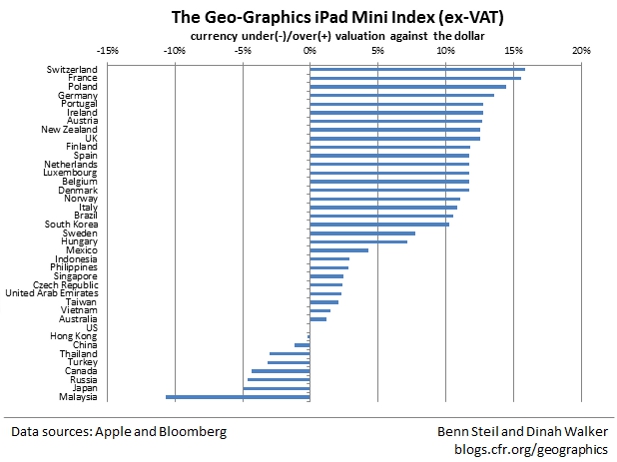China's RMB Fairly Valued, Euro Overvalued, According to Our Geo-Graphics iPad mini Index
More on:

The “law of one price” holds that identical goods should trade for the same price in an efficient market. To what extent does it hold internationally?
The Economist magazine’s famous Big Mac Index uses the price of McDonald's burgers around the world, expressed in a common currency (U.S. dollars), to estimate the extent to which various currencies are over- or under-valued. The Big Mac is a global product, identical across borders, which makes it an interesting one for this purpose. Yet it travels badly—cross-border flows of burgers won’t align their prices internationally.
So last year we created our own index which better meets the condition that the product can flow quickly and cheaply across borders: the Geo-Graphics iPad mini Index.
Today’s update is revealing. Despite the U.S. Treasury’s understandable obsession with China trade, iPad mini prices show China’s currency (RMB) to be fairly valued against the dollar. In contrast, the euro is way overvalued: it costs nearly 16% more to buy an iPad mini in France than it does in the United States. With Eurozone consumer price inflation running at a mere 0.7%, this suggests that it is high time for the ECB to bite the QE apple.
We thank Andrew Henderson for his contribution to this post.
Financial Times: ECB Policy Makers Plot QE Road Map
Wall Street Journal: Draghi Says ECB Still Unlikely to Engage in Quantitative Easing
Feldstein: A Weaker Euro for a Stronger Europe
The Economist: The Big Mac Index
Follow Benn on Twitter: @BennSteil
Follow Geo-Graphics on Twitter: @CFR_GeoGraphics
Read about Benn’s latest award-winning book, The Battle of Bretton Woods: John Maynard Keynes, Harry Dexter White, and the Making of a New World Order, which the Financial Times has called “a triumph of economic and diplomatic history.”
More on:
 Online Store
Online Store